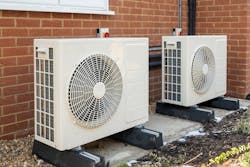How do you install heat pumps?
According to Matt Rusteika, director of market transformation at the Building Decarbonization Coalition, the skills to install a heat pump are the same as the skillset to install an air conditioner, whether it’s central or ductless. Heat pumps are also widely available in the marketplace.
“A heat pump shouldn’t be regarded as some new and fancy thing,” says Rusteika. “There are 20 million heat pumps installed today in the US. Fifty-six percent of them are in the South.”
How do heat pumps work?
A heat pump moves heat, it doesn’t generate heat.
With a furnace, it combusts fuel—oil, gas, or propane—and that fuel heats a piece of metal called a heat exchanger. A fan blows over it and that’s how a home heats up, explains Rusteika.
For heat pumps, there’s a copper pipe loop between the inside and outside. Coils are located outside and inside, and in between the two, there is a compressor.
Heat pumps run on two laws of physics: gases are hotter under pressure and heat moves from hot to cold. Compared to combustion, the heat pump doesn’t burn fuel, rather, it uses energy from the pump and compressor to harvest heat and move it.
“Heat goes into the coil, gets pumped through the compressor, the compressor puts it at high pressure so it’s very hot. It goes inside, air blows over the inside coil, deposits the heat in the house, comes back outside, gets depressurized again, and gets very cold, and starts the cycle again,” explains Rusteika.
What are the cons of heat pumps?
Heat pump performance in extreme weather has been noted as a major misconception and con for heat pumps. Efficiency drops as temperatures get colder, explains Russell Unger, principal at Rocky Mountain Institute.
“Most cold-weather heat pumps will draw heat out of the air at high volume down to freezing temperatures,” says Unger. “Heat pumps are throughout Maine, which is actually the most success of any state in terms of percentage of homes now heated with heat pumps. The nuance comes with how much capacity you need to have and some tradeoffs when you get in colder and colder climates.”
In 2019, Maine Governor Janet Mills announced a goal to install 100,000 heat pumps in the state by 2025. Mills achieved the goal in July 2023 and now has a new goal of 175,000 more by 2027.
Rusteika says the performance of the heat pump depends on the heat pump.
“When you look for a heat pump, you need to look for a climate-appropriate heat pump,” says Rusteika.
How much does switching to a heat pump cost?
With rebate incentives from the Inflation Reduction Act, switching to a heat pump could be more attainable.
“The IRA has moved low-income households from a place where economics wouldn’t play out to a place where we may see a lot of heat pumps,” says Unger. “Rebates up to $8,000 for the heat pumps and $6,500 for the wiring, so that really changes the math.”
If a homeowner is in a situation where they need to replace an existing heating system, it could be best for them to swap to a heat pump. The Department of Energy estimates that efficient electric heat pumps can save families approximately $500 to $1,000 annually.
“We mentioned Maine before and they’re doing so well there because you have air conditioning replacements where the marginal cost of switching to a heat pump is pretty small,” explains Unger. “In the parts of the country where your heating cooling loads are quite simple, that’s a complete solution. You reuse those same ducts. Or if there’s a home installing solar, there’s a lot of synergies there.”
How popular are heat pumps?
Shifts in policies such as construction codes and jurisdiction requirements have increased the adoption of heat pumps within the last few years. Still, many contractors remain skeptical.
“I think for many HVAC contractors, maybe they tried older heat pumps and it didn’t work as well in cold climates, so I think it’s that first heat pump install will be the hard one,” says Unger.
Heat pumps have outpaced furnace sales every month for the past two years, in addition to solar generation increasing about 40% in the last 20 years, and battery sales up 70% in the last 10 years,
“There’s a big shift happening right now. To remain competitive, to get ahead of what customers want, this is something for contractors to start paying attention to,” says Unger.
